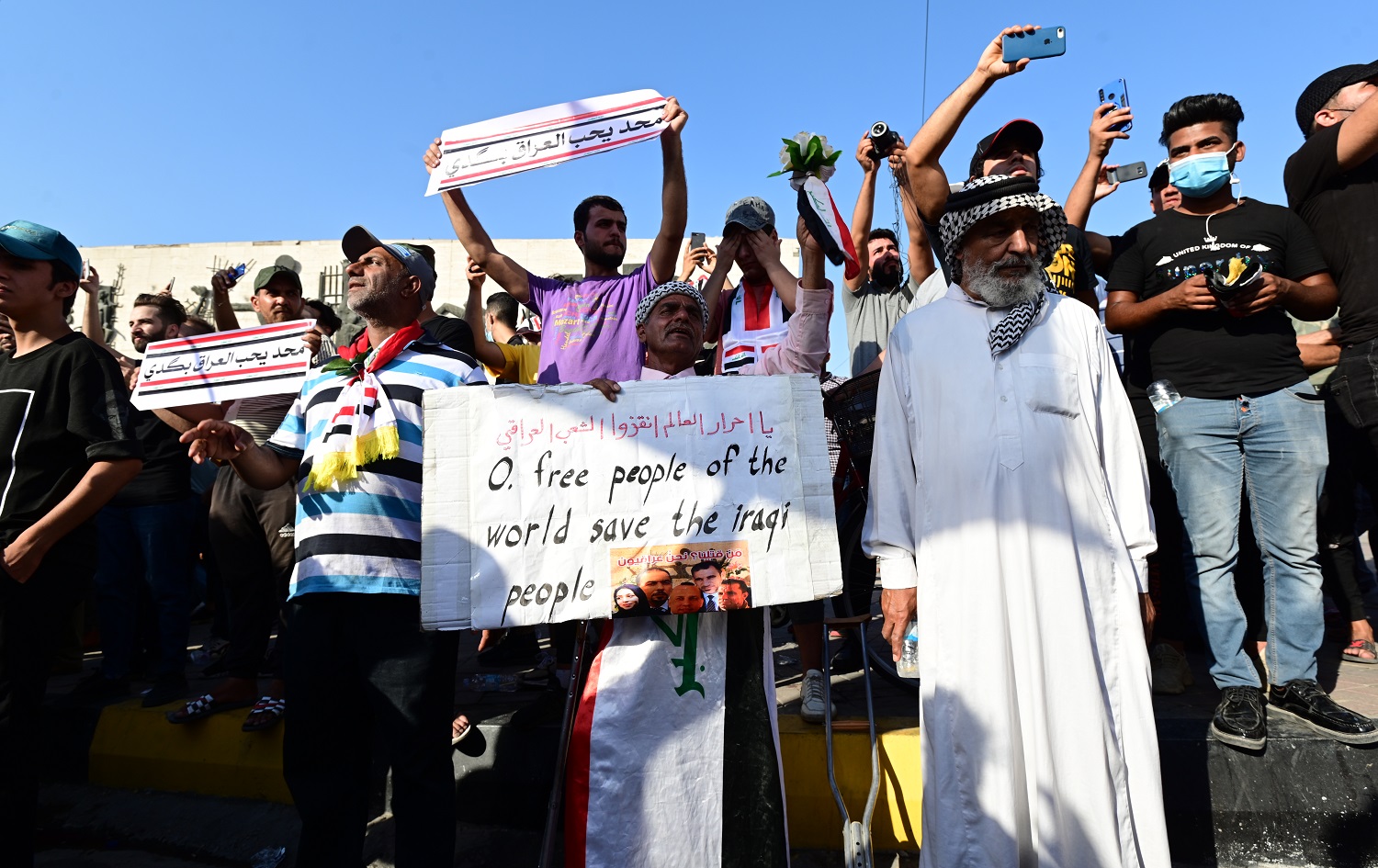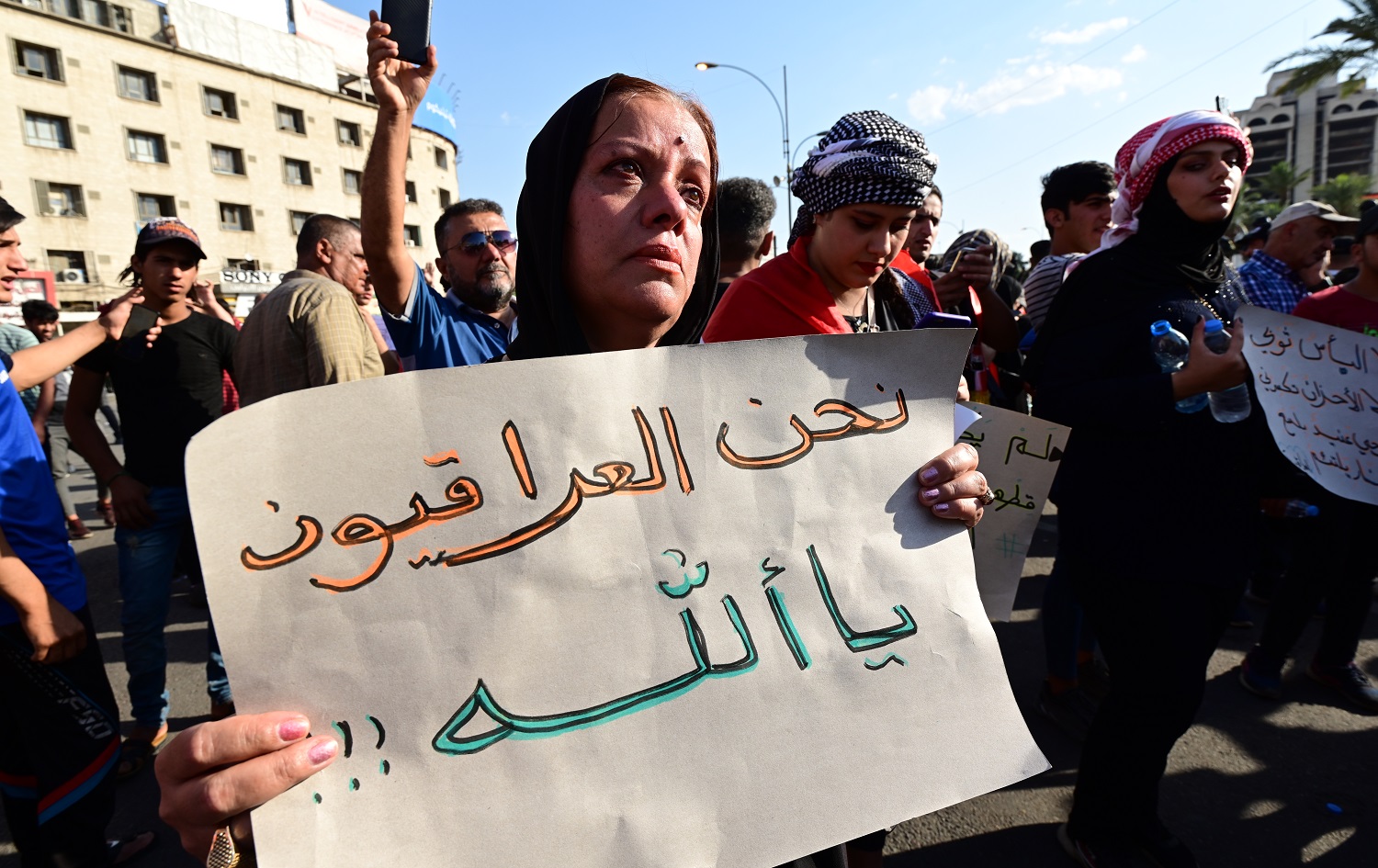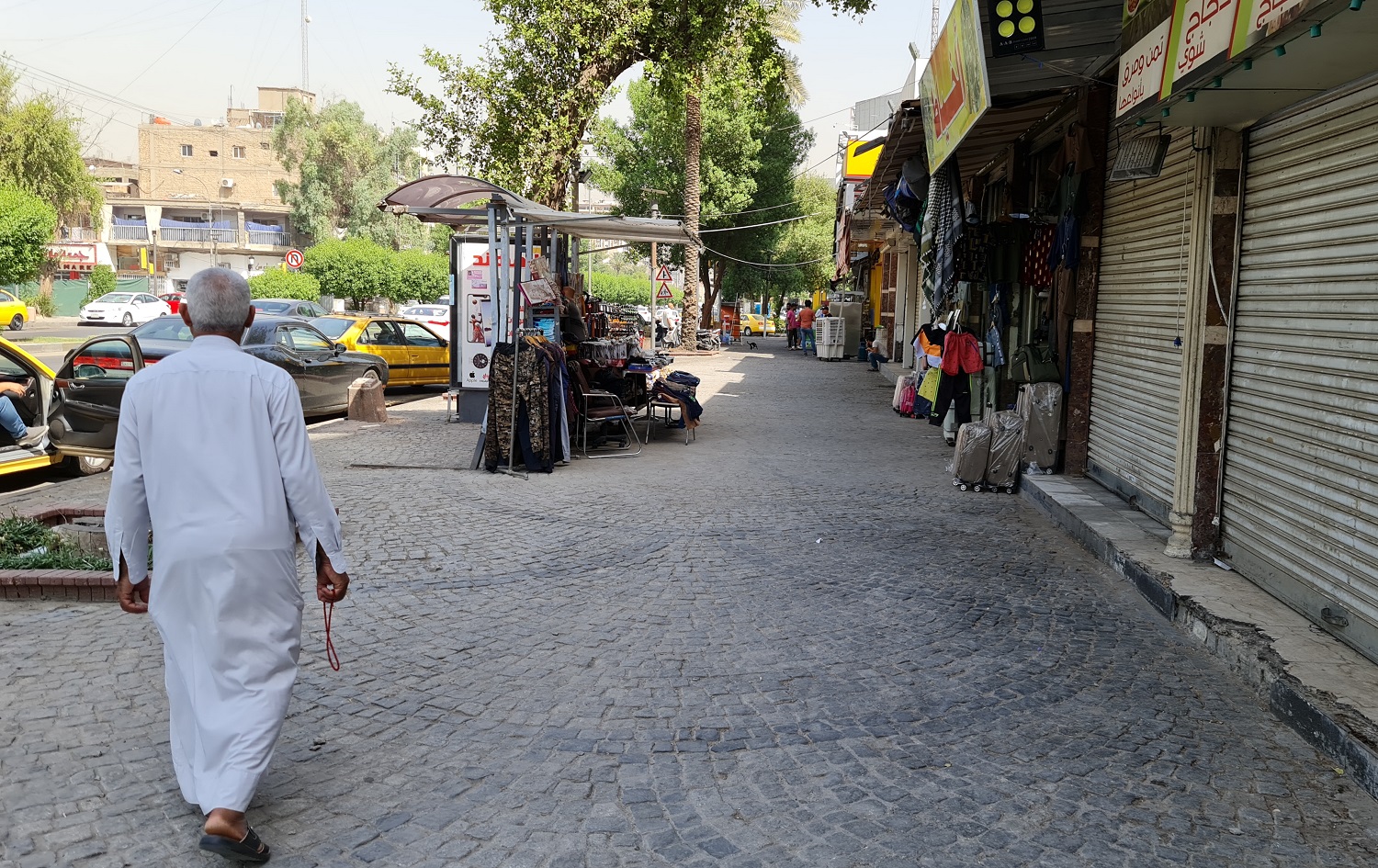BAGHDAD, Iraq — “Why? Why did you kill him? What has he done to you? He is unarmed!” A young man dressed in a black t-shirt and sweatpants, tears streaming down his face, screams at Iraqi riot police, standing a dozen metres away, in a line with their shields up. This was the scene in Baghdad’s Tahrir Square on May 25. The young man had just seen security forces open fire on his fellow protesters.
A demonstration, drawing thousands from across Iraq to demand an end to impunity for those responsible for the murders of dozens of activists and journalists, turned into bloody clashes between protesters and security forces. Two protesters were shot dead and dozens were injured, bringing to mind the deadly demonstrations of October 2019.
With elections four and a half months away, there are fears of a new escalation of violence that has already claimed the lives of nearly 600 Iraqis. Activists say that elections planned for October will hold no legitimacy as long as they are under threat.
The May 25 demonstration was the idea of Ihab al-Wazni, a prominent activist from Karbala. He first suggested it at the funeral of Jaseb Hattab, who was assassinated in the southern Iraqi province of Maysan in March. Hattab was the father of kidnapped activist Ali Jaseb, whose fate remains unknown.
In early May, Wazni made a public call for a mass protest. A few days later, he was shot dead in Karbala. After his death, protesters launched a hashtag #Who_Killed_Me? and called their protests “Ihab al-Wazni’s Revolution.”
Crowds of protesters began gathering on Tuesday morning in Baghdad’s Firdous, Tayaran, Nisour, and Tahrir Squares. Despite the summer heat, they gathered under the sun, chanting “thawra” (revolution).
By 3 o’clock in the afternoon, their numbers began to swell. Demonstrators raised Iraqi flags and the mood was upbeat. A small truck laden with loudspeakers blaring patriotic songs drove slowly around Tahrir Square. Young men stood on the truck, waving the Iraqi flag and leading a chant: "We will not abandon Iraq."
‘My son is dying’
One man in the crowd has a smile on his face and roses in his hand as he sings. He’s in his fifties and is leaning on a crutch. Dawood Salman is known to the Tahrir protesters as Haji Dawood. His right leg and foot were badly injured in the sectarian war in 2006. He was shot five times and miraculously escaped death. A decade later, he lost his son.
Alaa, 21, was arrested during anti-government protests in 2016. Haji Dawood said the charges against his son were fabricated by a “secret informant” and he was tortured to death.
He remembers the moment he received the fateful call. "Dawood, you can come to the forensic hospital to receive the body of your son," he recounted.
"What is the guilt of this child? He is not a politician or partisan. He never hurt anyone. May Allah comfort me,” Haji Dawood said, his eyes filled with tears.

A father of eight boys and girls, he comes to Tahrir Square to proudly follow his son’s path. With a bitter smile on his lips, he says, “I offered my son as a sacrifice to Iraq."
Now, Haji Dawood calls all of the young people in the square his sons and daughters. During protests in October 2019, he saw a young man lying on the ground with a teargas canister penetrating his skull and he wept for his own son, again. “This is Alaa. Alaa is down. My son is dying,” he cried.
‘To hell with Kadhimi’
Prime Minister Mustafa al-Kadhimi banned forces from using weapons against peaceful demonstrators. Mid-morning, spokesperson for the military’s joint operations Tahsin al-Khafaji announced security forces would "distribute water to the demonstrators, help and welcome them."
But the peace did not last.
As we entered Tahrir Square, the police searched our bags carefully. After confirming our identity as journalists, one of the officers whispered to me, "Try to leave the square before dark. The riot police will chase you and disperse the demonstrations by force."
When the sun started to set, riot police began trying to push protesters out of Tahrir Square towards Tayaran, where they surrounded the demonstrators and fired tear gas and live ammunition. Protesters responded by throwing stones.
Fear, tears, anger, and blood dominated the scene. A demonstrator was shot in the head. His body was carried out of the square, through Tahrir tunnel, and protesters chanted “There is no God but Allah.”
"What did this young man do to you? What is the crime he committed?” cried the man in the black t-shirt. “He is a peaceful and unarmed Iraqi. To hell with Kadhimi. Let every religious turban that brought you to power fall."

Protesters hunched behind walls and concrete blocks, hiding from the bullets as the night darkened.
"These incidents really raise the question of the extent of which the prime minister is actually able to fulfill his role as commander-in-chief and the extent to which security forces actually are doing what the prime minister is ordering them,” Belkis Wille, a senior researcher at Human Rights Watch, told Rudaw English.
Kadhimi ordered an investigation into the violence, saying "strict orders" had been issued to protect protesters, including a ban on using live ammunition. But these investigations and committees rarely translate into tangible results.
After the rare arrest of a militia leader on Wednesday allegedly involved in the killing of Wazni, Baghdad’s Green Zone – home to government ministries and diplomatic missions – was temporarily shut down because of threats from powerful pro-Iranian militias.
Wille said the human rights community has been urging the government for over a year to provide justice and accountability for the horrific assassinations and threats against protesters, journalists, and civil society members.
The use of force by government forces since October 2019 “are not designed to fall in line with international standards,” said Wille. “Instead the tactics being applied are really there to disperse crowds, even if they are peaceful, and using live ammunition to do that. As long as these tactics are there, we will continue to see more killings of protesters.”
The United States on Thursday said it was “outraged that peaceful demonstrators who took to the streets to urge reform were met with threats and brutal violence. Moreover, the violation of Iraqi sovereignty and rule of law by armed militias harms all Iraqis and their country.”
‘No legitimacy for elections’
When the protest movement began in October 2019, early elections and amendments to the election law were two of the main demands. The protesters saw early success – Adil Abdul-Mahdi stepped down and Kadhimi became prime minister with a promise to meet protest demands. Elections are scheduled for October 10, a year early.
But after assassinations, kidnappings, threats, and violence, protesters have lost trust in Kadhimi’s government, its ability to protect activists, and conduct fair elections under the shadow of powerful militias.
There were some calls to boycott the vote. That has been rejected, however, as activists pointed to the 2018 election when turnout was just 44.5 percent, the lowest since 2004. Influential parties ensured their survival and cemented their power and the worry is that a boycott this year would have the same result.
Now, activists are calling for a postponement until Kadhimi’s government ends the impunity the killers are enjoying.
"We all feel threatened and that we’ll die one by one. Therefore, elections cannot be held without revealing the killers of activists and confronting the militia's weapons," said Reda Hajwal, an activist from Karbala.
"We do not want to risk being part of the upcoming elections that give legitimacy to this corrupt political system. There is no legitimacy for the elections while we are all threatened,” he added.
The prime minister’s election advisor, Hussain al-Hindawi, said there can be no delay. The government has a ministerial platform and must hold elections on the specified date approved by the Independent High Electoral Commission.
"There are concerns, but we cannot take into account all of these concerns. The commission is ready to hold elections. There are no 100 percent fair elections anywhere in the world, as there are always problems and obstacles. But Iraq adheres to democracy,” Hindawi told Rudaw English.
The unrest in Iraq is not a sufficient excuse to postpone the elections as Iraq is an unstable country with no real guarantees, he added.
"Providing a safe environment is a difficult issue to achieve in Iraq, as it is an unstable country. But it is inevitable that elections will be held in October, as who will guarantee that the security situation in Iraq will not worsen in the future? So, I say, there are no guarantees,” he said.
While I was interviewing Hindawi, news broke of an attempted assassination of activist and paramedic Intisar Nahi. She said she was shot at by gunmen on a motorcycle.
"The state is responsible for protecting the activists, but activists bear some responsibility for protecting themselves, resorting to the Kurdistan Region, for example," Hindawi said.

The UN Security Council on Thursday, voting to renew the mandate of its mission in Iraq for another year, decided to send a team to monitor the vote.
Of the 340 parties competing in the elections, 10 are new entities formed by young leaders and members of the protest movement.
The morning after the deadly protest, life was returning to normal in Tahrir Square. Most of the evidence of the clashes had been cleared away, just a few stones littering were reminders of the violence. Riot police were in force under the Freedom Monument, batons at the ready in anticipation of more demonstrations. Rudaw’s photographer Bilind T. Abdullah took photos of the forces, but they stopped him, took his camera, and asked him to delete the images.
But the protest movement will not go away.
"In 2017, I was standing alone daily under the Freedom Monument, demanding justice for my son and for the disappeared, kidnapped and unjustly killed Iraqis,” said Haji Dawood. “I will continue to demonstrate until the last day of my life.”



